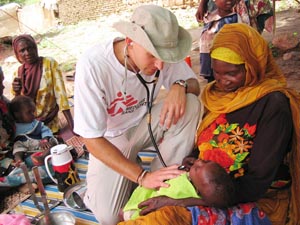Doctors Without Borders Displays “Help Wanted” Sign
Since 1971 Doctors Without Borders/Médecins Sans Frontières (MSF) has provided emergency medical assistance to individuals displaced from their homes by wars, natural disasters, and epidemics. Often rendering aid to people living in makeshift refugee camps around the world, MSF is now bringing “refugee camps” to the people this fall. Hoping to educate and inspire humanitarian action, the nonprofit organization will display “A Refugee Camp in the Heart of the City” exhibit in Chicago’s Grant Park from September 19 to 23 as well as hold an information session for prospective medical aid workers at the Feinberg School of Medicine on September 20.
 The group recruits medical personnel from physicians, nurses, and midwives to epidemiologists and laboratory scientists to volunteer for field staff positions in areas of the world in dire need of medical care. Stints range from a minimum of 6 months for physicians, with the exception of surgeons and anesthesiologists who may be given shorter assignments, to 9â12 months for other health care professionals. Basic requirements for physicians include a valid degree and up-to-date medical license, completion of a residency program, and current or recent practical experience.
The group recruits medical personnel from physicians, nurses, and midwives to epidemiologists and laboratory scientists to volunteer for field staff positions in areas of the world in dire need of medical care. Stints range from a minimum of 6 months for physicians, with the exception of surgeons and anesthesiologists who may be given shorter assignments, to 9â12 months for other health care professionals. Basic requirements for physicians include a valid degree and up-to-date medical license, completion of a residency program, and current or recent practical experience.
Looking for an appropriate venue for its recruitment efforts, MSF is partnering with the Feinberg School’s Department of Family Medicine’s new Global Health Education and Community Services (GHECS) program to bring this event to Northwestern. “Our goal is to promote medical care in low resource areas with a family medicine focus,” explains Catharine Smith, the program’s administrative coordinator. “The philosophy of the specialty—to care for patients of all ages from birth to death—makes our department a natural fit to work with Doctors Without Borders.”
Among several resources at Northwestern for medical students seeking global experiences, the GHECS program will serve as another avenue for information that the Department of Family Medicine will support with its unique strengths in training practitioners able to handle a wide range of health care matters. Headed by Bechara N. Choucair, MD, assistant professor of family medicine, the program will build on the department’s relationships with community clinics in the Chicago area and around the world. It will also serve as a good introduction to family medicine for students interested in the specialty, according to Smith.
“As we develop the GHECS program by cultivating contacts here and abroad, we are and will be available to advise students, for example, on places to go to obtain meaningful experiences,” says Smith, who joined the department in May. “We also will be doing debriefings with students and helping them translate what they may have learned in other countries to similar situations closer to home. There are opportunities to help refugees and displaced persons as well as care for underserved populations here in the United States.”
Dr. Choucair’s role as medical director at the Heartland Alliance for Human Needs & Human Rights, which provides care to homeless and low-income Chicagoans, will be integral to the expansion of the GHECS program. Through an evolving partnership with the Heartland Alliance’s international program, the Department of Family Medicine plans to promote research and educational opportunities for Feinberg School faculty members, residents, and students to perform community service in foreign countries such Guatemala.
“Students are very interested in pursuing global cross-cultural experiences and benefitting from specialized training,” says Smith. “Most schools like Northwestern are recognizing a need for a global presence and making international opportunities available to students.”
The Doctors Without Borders information session will be held September 20, from 6:00 p.m. to 7:30 p.m., in the Hughes Auditorium in the Robert H. Lurie Medical Research Center of Northwestern University at 303 East Superior Street in Chicago. For more information about the event, tours of the MSF mock refugee camp, or the GHECS program, contact Catharine Smith at 312/503-1474 or c-smith@northwestern.edu.
Posted September 10, 2007






